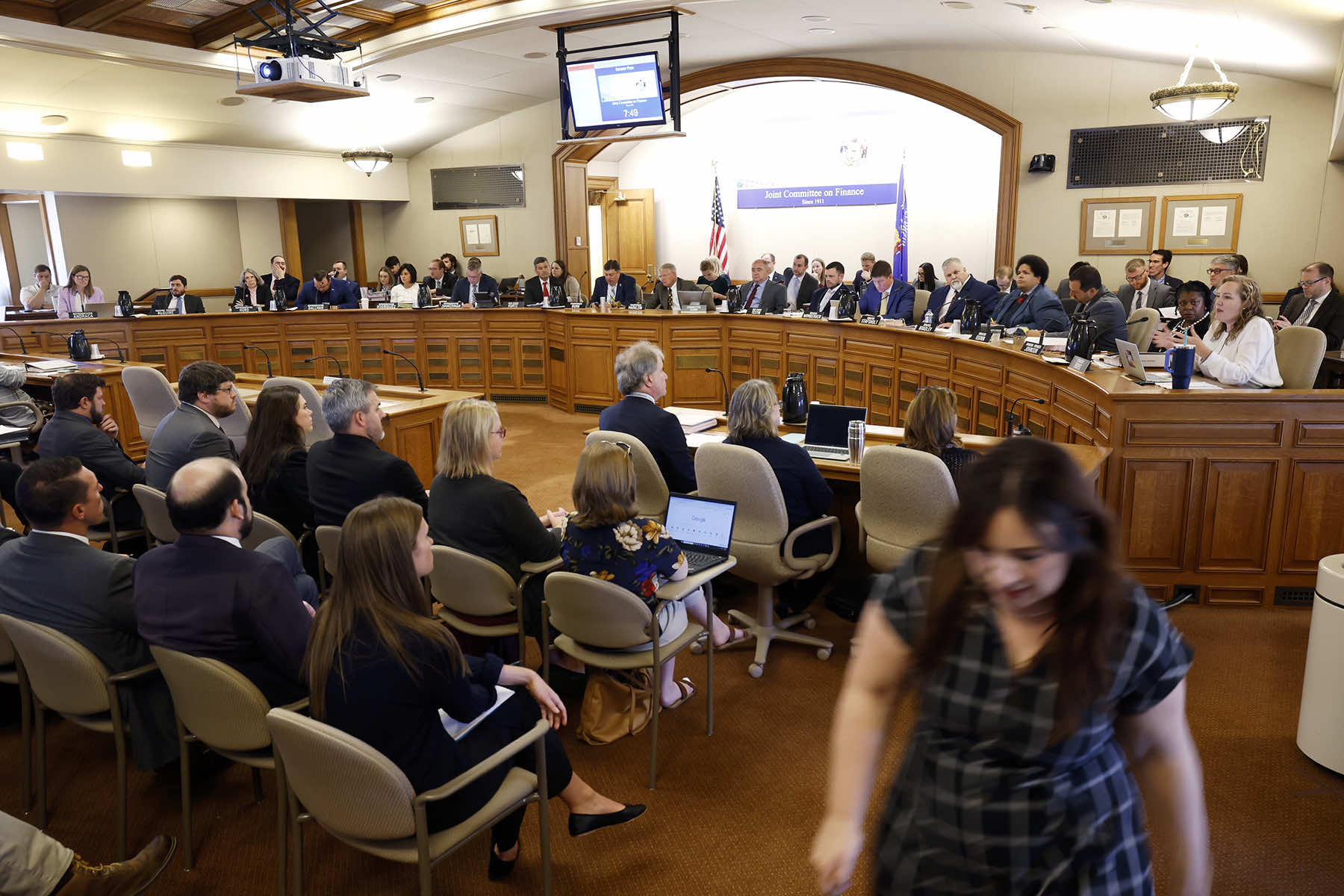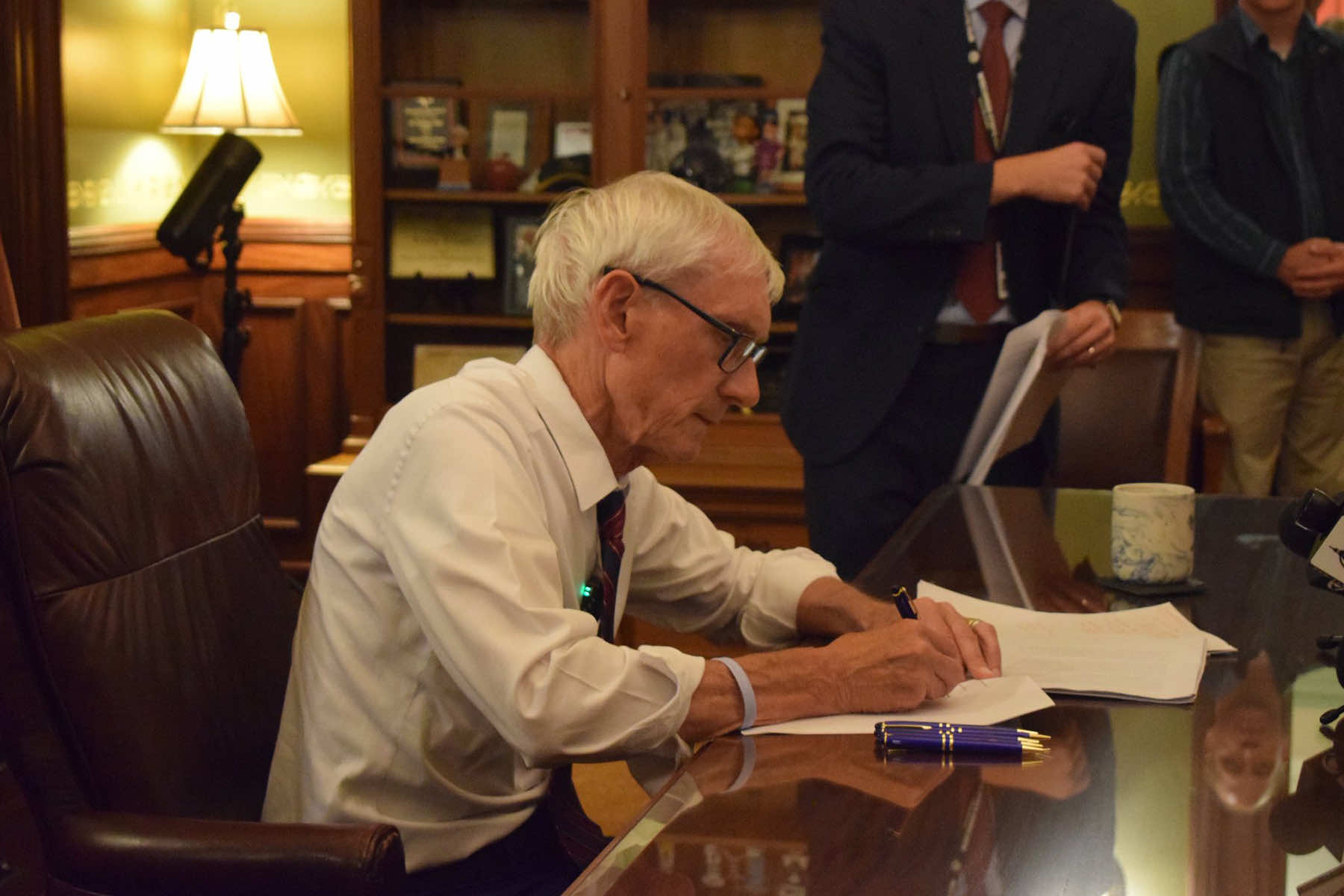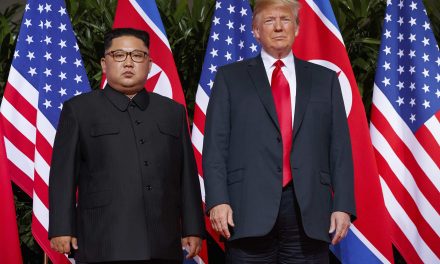
Wisconsin Governor Tony Evers signed a new two-year budget in the early morning hours of July 3 in a race against Congress to ensure the state gets a federal Medicaid match that it would lose under President Trump’s tax and spending cuts package.
A budget deal brokered by Governor Evers and Republicans, who control the state Legislature, cleared a key hurdle on July 1 in an extraordinarily rapid succession of events. The deal in the battleground state on a new two-year budget cuts income taxes, called for closing a prison, and increased funding for the Universities of Wisconsin despite a threatened cut.
Democrats who voted against the $111 billion spending bill said it did not go far enough in meeting their priorities of increasing funding for schools, child care, and expanding Medicaid. But Governor Evers hailed the compromise as the best deal that could be reached.
“I believe most Wisconsinites would say that compromise is a good thing because that is how government is supposed to work,” Governor Evers said.
He called the deal a pro-kid budget that was a win for Wisconsin’s kids, families, and the state’s future. Here is what to know about Wisconsin’s budget deal:
TAX CUTS
Governor Evers and Republicans agreed to $1.4 billion in income tax cuts largely targeting the middle class. More than 1.6 million people will have their taxes cut an average of $180 annually.
Republicans pushed for cutting taxes given the state’s roughly $4.6 billion budget surplus.
The deal would expand the state’s second-lowest income tax bracket and make the first $24,000 of income for people age 67 and over tax-free. It also eliminates the state 5% sales tax on electricity, saving taxpayers about $178 million over two years.
Republican legislative leaders praised the deal as providing meaningful tax relief to the middle class and retirees.
“This budget delivers on our two biggest priorities: tax relief for Wisconsin and reforms to make government more accountable,” Republican Assembly Speaker Robin Vos said in a statement.
HIGHER EDUCATION
The Universities of Wisconsin would see about a $240 million increase over two years, which includes $94 million for pay raises. UW Regents had asked for an $855 million overall increase and Republicans in June floated the possibility of an $87 million cut.
The deal also imposes a faculty minimum workload requirement and calls for an independent study on the system’s future sustainability.
PRISON CLOSING
The budget called for closing a troubled aging prison in Green Bay by 2029, but Governor Evers used his partial veto to strike that provision. He left in $15 million in money to support planning for the closure, but objected to setting a date without a clear plan for how to get it done.
The governor noted in his veto message that the state has “painful experience” with trying to close prisons without a fleshed-out plan, pointing out that the state’s youth prison remains open even though lawmakers passed a bill to close the facility in 2017.
“Green Bay Correctional Institution should close — on that much, the Legislature and I agree,” Governor Evers wrote. “It is simply not responsible or tenable to require doing so by a deadline absent a plan to actually accomplish that goal by the timeline set.”
SCHOOLS, ROADS, AND CHILD CARE GET MORE
There will be $200 million in additional tax revenue to pay for transportation projects, funded by a variety of fee increases for license plates, titling a vehicle, and renewing a driver’s license.
The agreement increases funding for child care programs by $330 million over two years, a third of which will be direct payments to providers. The money will replace the Child Care Counts program started during the COVID-19 pandemic. That program, which provides funding to child care providers, expired on June 30.
Funding for K-12 special education programs will increase by $500 million, but some Democrats opposed the deal because it includes no general aid increase for schools. That will lead to some districts losing funding, increasing the pressure to raise property taxes on homeowners.
State employees, including those at the university, would get a 3% raise this year and a 2% raise next year.
The budget deal was reached after Republicans killed more than 600 proposals by Governor Evers in the budget, including legalizing marijuana, expanding Medicaid, and raising taxes on millionaires.
GOVERNOR KILLS GRANT AS PAYBACK FOR ENDING STEWARDSHIP
Governor Evers also used his partial veto powers to wipe out provisions in the budget that would have handed the town of Norway in southeastern Wisconsin’s Racine County an annual $100,000 grant to control water runoff from State Highway 36. The governor said in his veto message that he eliminated the grant because Republicans refused to extend the Warren Knowles-Gaylord Nelson Stewardship Program.
That program provides funding for the state and outside groups to buy land for conservation and recreation. Republicans have complained for years that the program is too expensive and removes too much land from property tax rolls, hurting local municipalities. Funding is set to expire next year.
Governor Evers proposed allocating $1 billion to extend the program for another decade, but Republicans eliminated the provision. He accused legislators in his veto message of abandoning their responsibility to continue the program while using the runoff grant to help “the politically connected few.”
The town of Norway lies within state Republican Representative Chuck Wichgers and Senator Julian Bradley’s districts. Bradley sits on the Legislature’s powerful budget-writing committee.
DEMOCRATS CREDIT REDISTRICTING
Democrats said Republicans were forced to compromise because they did not have enough votes in the Senate to pass the budget without Democratic support.
Democrats gained seats in November under the new maps drawn by Governor Evers and narrowed the Republican majority in the Senate to 18-15. Democrats are hoping to win a majority in one or both houses next year.
“What we are seeing playing out in this budget is the consequence of Wisconsin’s new fairer maps,” Democratic Senator Jodi Habush Sinykin said in a statement.
Republican budget committee co-chair Senator Howard Marklein said, “This is a great example of a compromise.”
But Democratic Senator LaTonya Johnson described it as “a bipartisan effort by force, not by choice.”
WHAT COMES NEXT?
Governor Evers, who is midway through his second term, has said he will announce his decision on whether he will seek a third term after he has signed the budget. He has 10 business days to take action on the spending plan once the Legislature passes it.














